Städte
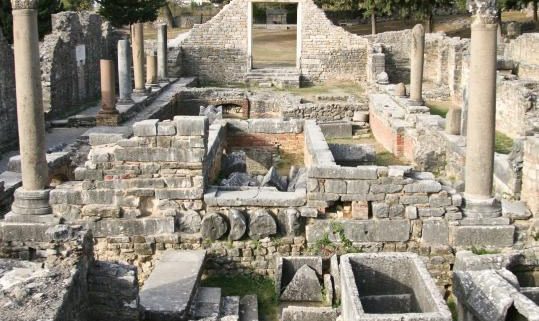
Salona
Solin, die Wiege der antiken und früh-kroatischen Geschichte, liegt am Fluss Jadro, der „kroatischer Jordan“ genannt wird, und ist die Stadt mit der jüngsten Bevölkerung in Kroatien. Solin ist eine Stadt mit einem reichen Kultur- und Naturerbe, was sie zu einem interessanten Reiseziel macht.
In dieser Stadt befindet sich das älteste Marienheiligtum in Kroatien, vor mehr als tausend Jahren von der Königin Jelena gegründet, dessen Kirche ihren Grabstein bewahrt, und den 1998 Papst Johannes Paul II besuchte.
Im Herzen von Solin liegt die antike Salona, einst die Hauptstadt der römischen Provinz Dalmatien und der größte archäologische Park in Kroatien, dessen Größe die imposanten Wehrmauern mit Türmen und Toren, das Forum mit Tempeln, das Amphitheater und Friedhöfe mit den Märtyrern aus Salona (Manastirine Kapljuč, Marusinac) beweisen. Salona war eine Stadt mit über 60 000 Einwohnern und der Legende nach der Geburtsort des Kaisers Diokletian.
Abgesehen von Salona, Ihre Gastgeber werden Ihnen gerne die Reste der Festung Gradina aus der Türkenzeit, die Wasser-Getreidemühle Gašpine mlinice aus dem 18. Jahrhundert zeigen, wo die Besucher eine Besichtigung der Mühle und der alten Werkzeuge machen können. Außerdem können Sie dort die sogenannte Hohle Kirche, die Krönungsbasilika des Königs Zvonimir, in der König Zvonimir 1076 zum König von Kroatien und Dalmatien gekrönt wurde, sowie das größte Meeresaquarium Kroatiens, das sich auf der Halbinsel Vranjic befindet, besichtigen.
Außer dem Fluss Jadro, der am Fuße des Gebirges Mosor 35 Meter über dem Meeresspiegel quillt und nach 4.5 km langem Kurs in die Bucht von Solin mündet, und in dessen Gewässern sich die endemische Unterart der Adria-Forelle entwickelte, gibt es in Solin ein reiches Naturerbe und zahlreiche Manifestationen, deren Ziel die kulturelle Interpretation des Erbes dieser Stadt ist.
Falls Sie sich für einen Aufenthalt in Solin entscheiden, können Sie Unterkunft in einem Hotel, in einer Herberge oder Privatunterkunft finden, und ein reichhaltiges kulinarisches Angebot, das besonders für Forelle bekannt ist, in unseren Restaurants im ruhigen Ambiente neben dem Fluss Jadro probieren.

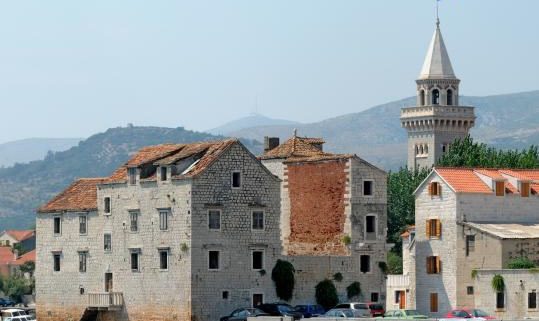
Kaštela
Kaštela ist eigentlich eine Reihe kleiner, pittoresker Städte in Mitteldalmatien, zwischen Split und Trogir. Kaštela nennt man heute sieben kleine, untereinander verbundene Ortschaften entlang der sog.
Kaštela Bucht. Dies sind: Štafilić, Novi, Stari, Lukšić, Kambelovac, Gomilica und Sućurac. Die Geschichte dieser Orte geht zurück in die Zeit der Neandertaler (Überreste wurden in der Höhle Mujina pećina gefunden), darauf war das Gebiet unter griechischer und römischer Herrschaft, als Kaštela auch ihren wirtschaftlichen und zivilisatorischen Aufschwung erleben, dann kommen die Kroaten mit der Völkerwanderung gefolgt von einer langen Periode unter Venezianischer Herrschaft bis zum heutigen selbstständigen Kroatien.
Zeugen dieser abwechselnden Einflüsse sind Überreste antiker Villen, altkroatische Kirchen und die schönen Schlösser – Kastells. Eine der schönsten Uferpromenaden befindet sich zwischen Kaštel Gomilica und Kaštel Lukšić.

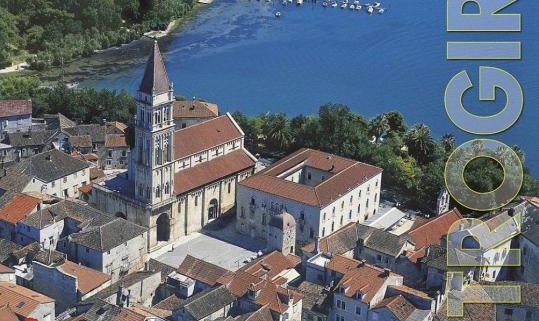
Trogir
Trogir befindet sich inmitten von Dalmatien, an der Adriaküste. Die Nähe zum Flughafen Split (5 Km) und zur Autobahn (nur 15 Km) machen Trogir und andere Häfen und Inseln in der Umgebung zu einem unvergesslichen Reiseziel während Ihres Besuches in Dalmatien.
Dank seiner Lage und der gut geschützten Bucht, ist der Hafen von Trogir heute sehr beliebt bei zahlreichen Nautikern aus aller Welt. Trogir bietet aber auch die Möglichkeit andere Sehenswürdigkeiten im Umfeld von einigen Hundert Kilometern zu besuchen – zum Beispiel die Städte Dubrovnik, Šibenik und Zadar, aber auch einige der schönsten kroatischen Nationalparks.
Trogir wurde von griechischen Kolonisten im 3. Jahrhundert vor Christi gegründet. Über die Jahrhunderte wechselten sich die Römer, Byzanz, Ungarn, Venedig und Napoleon ab.
Die kulturelle, humanistische und bauliche Höhe erlebte Trogir im Mittelalter, als Stadtmauern mit Abwehrtürmen um die Altstadt errichtet werden, wobei die vielen Gebäude aus der Romanik, Gotik und Renaissance der Stadt den Titel der am besten erhaltenen romanisch-gotischen Stadt in Mitteleuropa brachten, weshalb Trogir auch in die UNESCO Liste des Weltkulturerbes aufgenommen wurde.

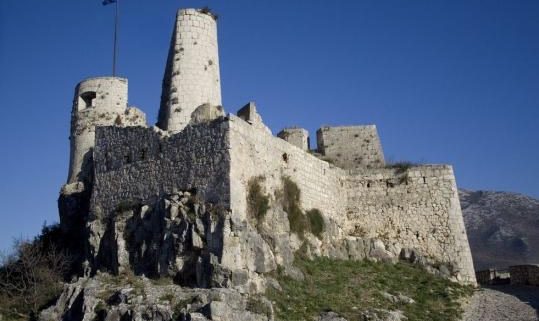
Klis
Der Hügel Klis bildet die natürliche Verbindung der Gebirge Mosor im Osten und Kozjak im Westen. In der Geschichte war Klis als Festung immer stark umkämpft – von den Illyren und Venedig, bis zu den Türken, die die Festung als Tor nach Dalmatien und Split sahen.
Unter der Festung entstand eine Siedlung die später von den Osmanen mit Mauern befestigt wurde. Die bekannte Festung von Klis ist Symbol des Ortes, aber auch Symbol des Widerstandes der vereinten Dalmatiner im Kampf gegen das osmanische Reich.
Klis ist bis heute die Verbindung zwischen der Küste und dem Hinterland, denn unter der Festung führt die Hauptstraße in das Landesinnere von Kroatien.
Die Festung Klis liegt 15 Km entfernt von Split.

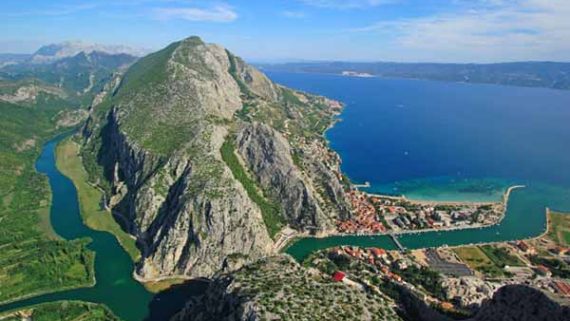
Omiš
Omiš ist eine kleine, malerische Ortschaft mit wahrem Mittelmeerflair, die direkt an der Mündung des Cetina Flusses liegt. Dies ist die Stadt des traditionellen Festivals von A´capella Sängergruppen, eine Stadt die über zwei hundert Jahre lang unter Piratenherrschaft stand ( 1221 – 1444). Neben dieser Stadt entwickelte sich auch die Poljica Republik – die erste Dorfrepublik in Europa.
Omiš liegt im Herzen Dalmatiens, zwischen den zwei Tourismuszentren Split und Makarska. Nach seiner turbulenten und interessanten Geschichte, von der Antike bis zur unbesiegbaren Festung der Piraten von Omiš, ist die Stadt heute ein sehr beliebter Urlaubsort.

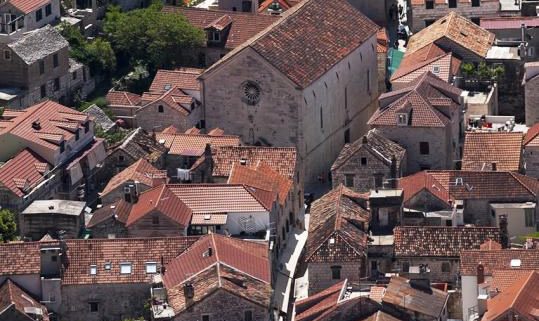
Šibenik
Die Stadt Šibenik ist das Zentrum der Gespanschaft Šibenik – Knin, und befindet sich um die 85 Km entfernt von Split, im zentralen Teil der kroatischen Adriaküste, inmitten einer zerklüfteten, malerischen Bucht in die der Fluss Krka mündet.
Dies ist gleichzeitig die älteste, von Kroaten gegründete Stadt an der Adria. Am bekanntesten in der Stadt ist heute sicher die Kathedrale des hl. Jakobs, als wichtigstes Baudenkmal des 15. und 16. Jahrhunderts in Kroatien. Wegen seiner Einmaligkeit wurde die Kathedrale im Jahre 2000 in das UNESCO Weltkulturerbe eingetragen.

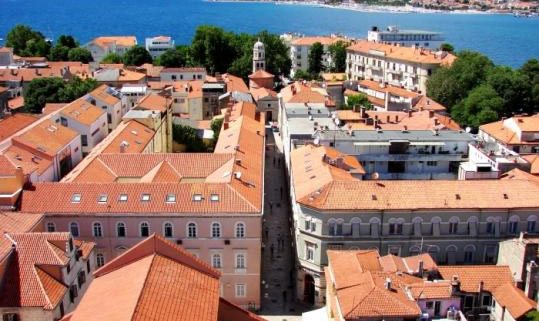
Zadar
Zadar befindet sich 168 Km entfernt von Split und ist das Zentrum der gleichnamigen Gespanschaft Zadar, dem Regierungsbezirk Norddalmatiens.
Es handelt sich um eine alte Stadt, die stolz auf über 3000 Jahre ihrer Geschichte schaut. Zum ersten Mal wird Zadar im 4. Jahrhundert vor Christi erwähnt als Siedlung des illyrischen Stammes Liburni – unter dem Namen Jader.
Diese Stadt überzeugt mit ihrem Reichtum und Vielfalt an historischen und kulturellen Denkmälern, darunter das römische Forum, der hl. Donatus und von neuen Installationen ziehen der „Gruß an die Sonne“ und die „Meeresorgeln“ ebenso zahlreiche Besucher an.


 Deutsch
Deutsch Hrvatski
Hrvatski English
English Italiano
Italiano Français
Français

